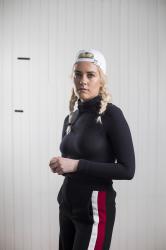When actress Ingunn Mía Blöndal and writer and director Lovísa Lára Halldórsdóttir decided to make a short film together, they wanted to push boundaries, but definitely didn’t expect to find a worldwide audience for their work. The film, ‘Fyrirgefðu’ (‘I’m Sorry’), tells the story of abuse in a queer relationship and has found unprecedented resonance in both the queer and straight community, being screened everywhere from Iceland and America to Russia, Australia, Nigeria, India, and beyond.
Personal pain
The film was primarily inspired by Ingunn’s personal experiences with abuse. “I have been abused by a girl and I met a lot of resistance when I told that story, being told it didn’t happen because it was a girl,” she explains. “I’m queer and I wanted to talk about queer relationship abuse because it’s not talked about at all.”
Lovísa realised this wasn’t an isolated experience. “I remember I was with friends and we were talking about a queer friend of ours and they were saying, ‘Oh, he’s so dramatic, he is always fighting with his boyfriend’ and then they just went on talking,” she says incredulously. “That always stuck with me because imagine if it was said about a man and a woman. No one would say that so casually. Why do we skate over that as if it is not abuse?”

Ingunn also wanted to bring another facet of abuse into the equation—that relating to physicality. “I was also in an abusive relationship with a guy for many years and people tend to disbelieve it because he was smaller and thinner than I am,” she explains, “which is why it was important to me that the girlfriend in the movie is smaller than me. I don’t give a shit about appearances but this was important. Abuse is not about bodies.”
Trust & intensity
The film tells the story of Addý and her girlfriend Salka, a relationship which looks perfect from the outside. One day at work, a co-worker of Addý’s helps a friend of hers who is being abused and seeing that makes Addý realise the flaws in her own relationship.
With a topic so close to home, the filming process was intense, but the trust between the two long-time friends made it possible. “I usually don’t want actors to go into their own experiences because it can be emotionally draining and take them to dark places,” explains Lovísa. Ingunn, though, felt safe and supported on the set. “I would tell Lovísa, say my trigger three times and I will cry. Then we should shoot and I trusted her. In my mind, I knew I was helping people talk about something that had been shut down for too long, which helped,” she says.
Finding hope
The initial months of the production were hard, particularly due to a disturbing experience at their film school. “There was a teacher who said it wasn’t rape because there was no penetration. There was no penis,” Ingunn reveals. “We felt, OK, is this a real perspective? He wanted us to change it, he wanted me to have a knife. He said there was no threat. If the girl was not going to rape her, why doesn’t she have a knife?”

But while it was a discouraging experience for the two—particularly given the sensitive subject matter—the responses from actual filmgoers and those within the industry was radically different. At the most recent festival in New York, they even had performers from Stonewall in attendance. “What Ingunn gave me was a challenge,” says Lovísa. “It’s something that people who are not queer don’t think about, but I’m happy they are thinking about it now.”
Buy subscriptions, t-shirts and more from our shop right here!


















